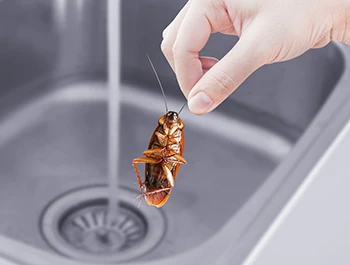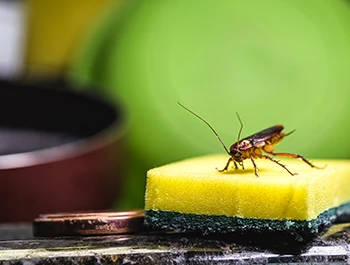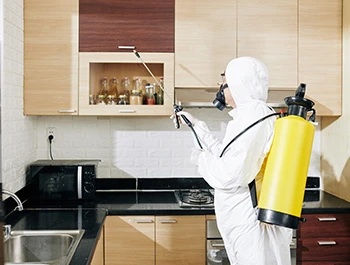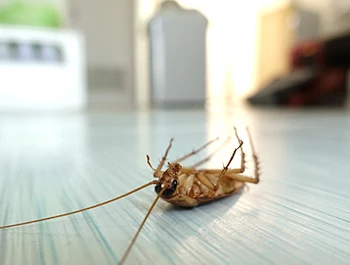Cockroaches are the biggest nightmare of every household. They can get into anything and anywhere. The worst part is, they don’t stop once getting into the appliances, they start to mark their territory all over the place.
So if you have noticed small roaches inside your dishwasher, you might be wondering, can roaches damage a dishwasher? The answer is, yes, they can. In fact, they will not only damage the inner components by chewing the wires, but they will also contaminate the dishwasher and give birth to diseases.
How can you prevent it? This all has some solutions that you can take. Today, we look forward to sharing it all with you.
Can Roaches Damage A Dishwasher?

Cockroaches are attracted to the inner environment of your dishwasher as it remains moist and warm. That’s why, they happily increase their numbers by breeding quickly inside the dishwasher. Soon, you will notice there are thousands of cockroaches which may seem extremely gross.
The small cracks and crevices of your dishwasher are the loophole for roaches to enter it. Once they enter the dishwasher, they can damage the interior by chewing the wires, contaminating the area through droppings and skins. Also, they spread bacteria which can be dangerous for your well-being.
Here are a few problems that cockroaches cause:
- Contamination: roaches get inside your dishwasher and breed. Also, they leave droppings, and skins in the dishwasher, including eggs. This can be extremely unhealthy unless you clean the dishwasher to use it again.
- Biting wires: you may face potential damage and even your dishwasher may stop working if cockroaches bite the wires. They have the tendency to chew wires and chewable components.
- Drain clogging: cockroaches can spread eggs, and skins inside the drain and cause water flood. Besides, they also tend to get inside the drain which causes drain clogging.
- Bacterial growth: roaches contain bacteria that can spread inside the dishwasher if you don’t take care of it. Your utensils may get infected through this.
- Gross odors: cockroaches smell really bad and it leaves a foul odor due to the skin shedding. It can make you feel like puking unless you clean the dishwasher.
Why Do Cockroaches Like Dishwashers?

Cockroaches are attracted to dishwashers due to the warmth and moist environment of the interior. Besides, leftover foods can remain in the dishwasher which attracts roaches. They can live by the food particles and breed safely. Moreover, the dark area lets them hide from predators.
Dishwashers are the best place for cockroaches to live happily as they have adequate food sources, protection, and the right environment to breed more. That’s why they choose this spot to be their perfect home.
How Do Cockroaches Get Into A Dishwasher?
The small openings of a dishwasher are the main pathway for the roaches to enter there. The openings and gaps act as loopholes for them. As they can smell the food particles, they enter the dishwasher and live there.
The dishwasher door, hinges, and other components contain several cracks and gaps for roaches to enter. Also, they can enter through the drain lines from your kitchen sink or garbage disposal. They can easily crawl to the dishwasher when the drainage system is open and dirty.
Not only that, but roaches can also get into the dishwasher through your utensils if there are any roach eggs. Besides, the electrical connections also work in their favor to enter and live inside the dishwasher.
Where Do Cockroaches Live In The Dishwasher?
Your dishwasher has many suitable places for the roaches to live and make a large family. The interior wall crevices and gaps are the best places that offer darkness and moisture to them. You can also find them in the door gasket.
If your dishwasher has a window, they can live in the corners. Mostly, roaches are found in the gross drain area as they can find food particles to live on there. Any spot which is difficult to access is their favorite spot to live and damage.
How To Prevent Cockroaches In The Dishwasher?

Cockroaches can breed very fast which can be uncontrollable if you don’t take the right steps at the right time. Here are a few ways to deal with a cockroach infestation:
- Keep everything clean: a clean area never attracts roaches or other insects. They like to live on dirty surfaces. So if your dishwasher is greasy or dirty, make sure to clean it well to avoid roaches. You can use cleaning solutions to prevent their breeding. Also, make sure to clean the gaps and dark, small spots to kill them.
- Get rid of food particles: after washing the dishes, don’t forget to clean the dishwasher thoroughly. Food particles can attract more roaches inside and it will be uncontrollable soon after. If there is no food, roaches won’t be attracted to live and breed.
- Be careful of the openings: look for the openings and gaps in the dishwasher and seal them well. If any drain line opening is near the dishwasher, make sure to clean that and seal it properly. After every usage, clean the dishwasher and lock it well.
- Use boric acid: sprinkle an adequate amount of boric acid around the dishwasher to kill the roaches and then clean the dishwasher. Boric acid kills the roaches by disrupting their digestive systems. However, you might need to rely on other methods to destroy the eggs.
- Keep the inside dry: a moist environment attracts roaches more and they tend to breed in such an environment. So, once you are done with the dishes, use a clean cloth to wipe the insides of the dishwasher to keep it dry.
- Ensure weekly cleaning: every once a week, clean the kitchen and dishwasher thoroughly using cleaning solutions. Before you clean, use safe insecticides that kill cockroach eggs. If you notice any eggs inside the dishwasher, immediately clean the whole appliance using cleaning solutions.
- Hire a professional: if you notice that the infestation is beyond your control, immediately call a professional to deal with it. Their thorough cleaning will save you time and get rid of every cockroach through specialized treatments and techniques.
Natural Remedies For Roaches In Dishwasher

You can’t use every kind of roach killer when the infestation is in your dishwasher. So, you can rely on natural remedies that work the best without causing any issues. Here are some:
- Borax powder: as we mentioned earlier, this natural mineral can destroy the roaches in an hour. You have to pour the powder into a layer inside the dishwasher and leave it for an hour or two. Then raise the temperature of your dishwasher to the highest setting to kill the roaches.
- Baking soda and vinegar: baking soda and vinegar have been awesome household saviors. Sprinkle baking soda over some vinegar inside your dishwasher and the reaction will kill the roaches. Then clean your appliance thoroughly to remove everything. Vinegar also eliminates the awful smell of cockroaches.
- Diatomaceous earth: diatomaceous earth is a natural insecticide for cockroaches. You have to use a thin layer around the dishwasher and leave it overnight in there. Then clean the dishwasher to get rid of the dead bodies.
Further Inquiries Cleared
1. How Do I Keep Roaches Out Of My Dishwasher?
Cockroaches are mainly attracted to food particles and the moist environment of your dishwasher. So you have to keep the dishwasher clean and dry to prevent cockroaches from entering. Besides, seal any openings that they might use to enter the appliance.
2. Can You Spray Roach Spray In A Dishwasher?
No, as roach sprays contain toxic ingredients, you cannot spray them in your dishwasher. However, you can rely on natural cleaning solutions that work wonders to keep your dishwasher out of roaches.
3. Do Dirty Plates Attract Roaches?
Yes, dirty plates are like magnets for roaches. If the plates contain food particles, roaches can smell them and get inside the dishwasher pretty quickly.
Wrapping Up
As you know the answer to can roaches damage a dishwasher, you have to be more careful about preventing them. The damages are quite troublesome to handle, but mostly, cockroaches are health hazards. As a result, you need to take all the measures so that you can prevent the roaches from breeding.
